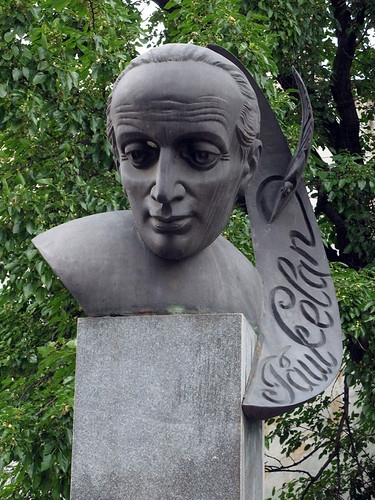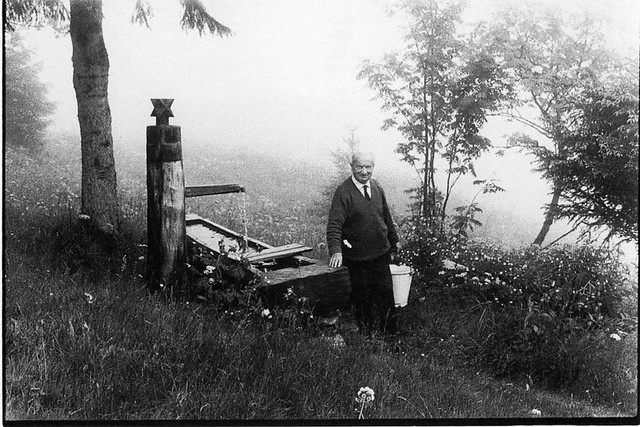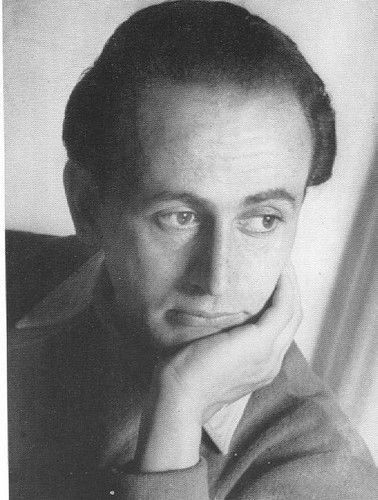Via Flickr:
«Celan cherche dans la poésie le personnage décrit lui-même» (page 157).
_______________________________________________________
Todtnauberg
Shortly after giving a Der Spiegel interview and following Paul Celan's lecture at Freiburg, Martin Heidegger hosted Celan at his chalet at Todtnauberg in 1967. The two walked in the woods. Celan impressed Heidegger with his knowledge of botany (also evident in his poetry), and Heidegger is thought to have spoken about elements of his press interview. Celan signed Heidegger's guest book.
Celan later wrote a poem entitled Todtnauberg which concerned the meeting.
The chalet features in the film The Ister.[2]
In 2006, BBC Radio 4 produced a play with the title 'Todtnauberg', telling the story of the meeting between Celan and Heidegger, but also the story of Hannah Arendt's affair with Heidegger. The play was written by John Banville and starred Joss Ackland as Heidegger.
________________________________________________________
Todtnauberg
by Paul Celan
Arnica, eyebright, the
draft from the well with the
starred die above it,
in the
hut,
- whose name did the book
register before mine? -,
the line inscribed
in that book about
a hope, today,
of a thinking man's
coming
word
in the heart,
woodland sward, unlevelled,
orchid and orchid, single,
coarse stuff, later, clear
in passing,
he who drives us, the man
who listens in,
the half-
trodden wretched tracks through the high moors,
dampness,
much.
(Translated by Michael Hamburger)
___________________________________________________________
. . . mit einer Hoffnung auf ein kommendes Wort im Herzen
Paul Celan
quando celan visitou heidegger, e passearam
pelo bosque antes da chuva, ao despedir-se escreveu
no livro da casa sobre a esperança de uma
palavra a vir no coração. e repetiu em todtnauberg,
dois anos antes de morrer, a referência obscura
à linha escrita nesse livro, de uma esperança, então, de que,
a um ser pensante?, de um ser pensante?,
viesse uma palavra no coração. no coração, no lugar onde
a palavra reconcilia por lá se encontrar desde antes,
esperadamente. ao coração, seria menos visceral.
ou já lá estava pronta a vir ou não valia a pena
fosse quebrado o silêncio em tanta expectativa.
as raízes do fogo e do sangue são as raízes
violentas do poema, no seu magma revolto de estranhezas
ou nalguma ténue chama azulando-se em sílabas
delicadas como asas. instalada no coração,
uma palavra, uma oferenda de música e plantas silvestres,
viria a irromper do orvalho, benfazeja, transportando
se não o esquecimento, a paz. uma palavra.
tudo o que celan pedia e não sabemos se obteve
e talvez ainda procurasse numa noite de abril, no rio sena.
— Vasco Graça Moura
when celan visited heidegger and they walked
in the woods before it rained, on leaving he wrote
in the visitors’ book about his hope in a
word to come in the heart. and in todtnauberg,
two years before dying, he again referred to the obscure
phrase written in that book, about a hope that a word
would come (to a thinking being? from a thinking being?)
in the heart. in the heart, that place where
the word is able to reconcile since it’s there beforehand,
ardently waiting. to the heart would be less visceral.
either it’s already there, ready to come out, or there’s no point
in breaking the silence with so much expectation.
the roots of fire and of blood are the poem’s same violent
roots, in its convulsive magma of wondrous things
or in a tenuous flame bluing into syllables
delicate as wings. planted in the heart,
a word, an offering of music and wild plants,
would come from out of the dew and bless, if not
with forgetting, then at least with peace.
that was all celan asked for and we don’t know if he obtained it
or if he still sought it, one april night, in the seine.
— Vasco Graça Moura
(Trans., Richard Zenith)
______________________________________________________
This poem has been a feeding ground for rival critics ever since it was written. This is primarily because it records Celan's only visit to Martin Heidegger's rural retreat in 1966. Heidegger is considered by many to be the 20th century's greatest thinker yet his reputation is tarnished by his support for the Nazis and his refusal to atone for this after the Second World War. Celan was an avid reader of Heidegger and admirer of his work yet he was also a Holocaust survivor and so had a deeply personal interest in hearing what Heidegger had to say about his Nazi past.
The poem is a single sentence and reads like a series of notes for a longer piece, it is also sufficiently ambiguous for us to be uncertain whether Heidegger actually delivered the 'coming word'. The poem tells a fairly clear story- Celan arrives at the hut, notices eyebright and arnica dotted around and drinks from a well with the 'starred die' above it. He writes in the guest book, expressing his hope for some kind of explanation/apology. The two men go for a short walk but it is raining. On the way back in the car Heidegger utters some 'coarse stuff' which their driver hears.
There are those of us that would argue that 'Todtnauberg' is not a very good poem when compared with the rest of Celan's later work and that it doesn't much matter whether a kind of reconciliation was achieved. What this poem does is cause us to question whether any 'coming word' could ever be sufficient in the light of the industrial extermination of the Jews. Heidegger's complicity in this atrocity continues to be the subject of heated debate on both sides of the Atlantic but no-one can read his Rectorship Address of 1934 and doubt that he was fully immersed in Nazi ideology. Celan's adult life had been committed to bearing witness to the Holocaust and it is therefore extremely unlikely that anything that Heidegger could have said would in any way be sufficient.
In terms of interpretation, Philippe Lacoue-Labarthe notes the poem's note of disappointment and exhaustion whilst Pierre Joris points to the word 'Waldwasen' (translated above as 'woodland sward') which 'one could nearly translate as "killing fields". On the other side of the divide, J H Prynne relies on the work done by J K Lyon to demonstrate that a reconciliation of sorts did actually occur and that the poem is a reflection of this.
I'm of the view that the reference to other names in the book is an allusion to the fact that Heidegger entertained his Nazi proteges in the hut and I'm also persuaded by the use of 'Waldwasen' to suggest that the two men were walking over the bodies of the dead.
Incidentally the 'starred die' above the well isn't any kind of die but a star shape cut from a single block of wood. This was clearly significant to Heidegger but no-one seems to know why.
Traducere // Translate
Todtnauberg
Abonați-vă la:
Postare comentarii (Atom)

Niciun comentariu:
Trimiteți un comentariu